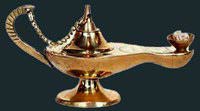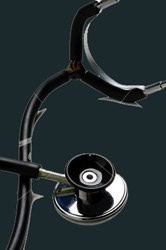Most instrumentalists practice scales. (At least the good ones do.) If you're a drummer, though, there's no such thing as a scale: a drum only has one note. So, drummers practice rudiments, basic patterns and combinations that form the building blocks of the rhythms they play.
The first rudiment I learned about was in elementary school, where we heard that drummer boys in the Revolutionary War were right around our age, and, not knowing their right from their left too well, remembered the basic roll (
Brrrrrrrrrr! the one you hear right before the national anthem, or before a guy gets executed in a historical movie) by saying "Mom-my-Dad-dy" along with the R-R-L-L pattern.
Today I'm thinking of the paradiddle. Besides having a delightful name, it's a useful rudiment. It's simple but just-hard-enough so that the average drummer knows it in his sleep but the average non-drummer has a hard time even picturing it. The pattern is R-L-R-R, L-R-L-L. See if you can train yourself to tap it out.

I'm always surprised at musicians who know a little or a lot about theory but don't have any idea how it plugs in to making music. For instance, even though the paradiddle (I just love saying that word!) was developed long before rock music, much less funk, drummers use it (and its variations) all the time. Take a look/listen. I've used the immensely helpful Scorch plugin here; it's safe (from the reputable Sibelius music company), downloads immediately, and consists pretty much of two fonts that allow you to see and hear and print music. You can press the play button and hear the written music as it goes along.
Interesting, eh? You've heard that beat a thousand times, and never knew it was based on the paradiddle.
Looking more closely at it, you realize why drummers are drawn to M. C. Escher. It's symmetrical, but in an intriguingly interlocked way. It reminds me of the Escher drawings in which the negative space of an object transforms into an equal and opposite positive thing of its own, using the originally foregrounded object as background. Get it?









